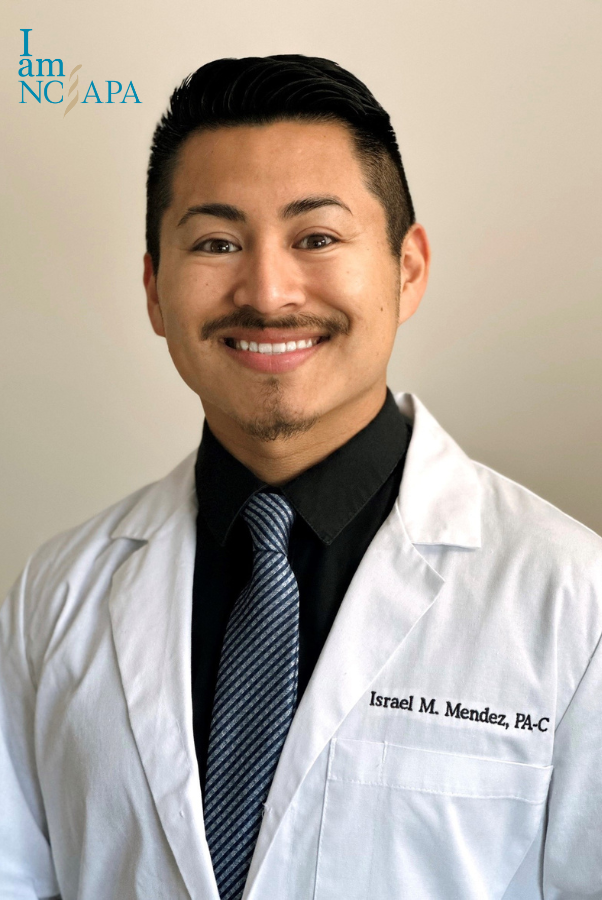For May’s #IamNCAPA Member Highlight, NCAPA sat down with Family Medicine Physician Assistant (PA), Israel Mendez.
Team-based care is certainly the way to go and gives patients the best outcomes. It also helps prevent burnout in the medical field since you have a reliable team you can pull ideas from and lean on.
Israel Mendez, MS, PA-C

Israel’s family is originally from Guatemala, but he was raised in Morganton, a town in Western North Carolina with a population of about 18,000. NCAPA chatted with Israel on how he was exposed to a PA in high school, his role as a PA in a Federally Qualified Health Center (FQHC), and his hope for diversity and inclusion within the PA profession to benefit all patients.
“I’ve always known that I wanted to be in the medical field since high school,” Israel began. “In the 11th grade, my mother had an appointment with a PA and received exceptional care. The PA was very knowledgeable and caring, so I was immediately intrigued and desired to know a PA’s responsibilities and how to become one. Long story short, I started shadowing the PA, and she became one of my mentors. Shout out to Kristen Fromal PA-C! Of course, I cannot forget about my roots, so I want to give a huge shout out to Freedom High School and RN Amy Howell for exposing me to healthcare and certifying me as a nursing assistant which set me up for success and fueled my passion for medicine.”
Israel graduated East Carolina University’s PA Program in December 2020. He currently works in Family Medicine at an FQHC called MedNorth Health Center in Wilmington, NC. “I love my job. My favorite part about my job is probably the diversity of my patients and my scope of practice. One minute I’m doing a well-child check, and the next minute I’m seeing a prenatal patient, then a punch biopsy on a lesion, followed by management of a patient’s diabetes and hypertension… no day is ever the same. Since I’m fluent in Spanish, much of my patient population is Spanish speaking. I also love that at community health centers, we can provide quality care to people regardless of their insurance status. Thus, a large portion of my patients are uninsured.”
When asked of his opinion on the value of team-based care, Israel shared, “Medicine is so complex and there are new discoveries every day. For someone’s care to fall under just one person is unrealistic. On any given day you may have a nurse triaging complex patients, a medical assistant taking vitals and updating charts, a pharmacist counseling on medications, a LCSW handling a crisis…I could go on and on. Team-based care is certainly the way to go and gives patients the best outcomes. It also helps prevent burnout in the medical field since you have a reliable team you can pull ideas from and lean on.”
NCAPA asked if there was one patient or story that stands out to Israel to this day. He smiled and shared, “There are so many.”
“I never cry in the rooms but this one time, I almost did. I had a child who had recently moved from another country come in and see me. The child could not walk due to complications at birth. While examining this patient, I saw multiple scars along both legs and when I asked about them, the child said, ‘There are no wheelchairs where I am from, so I had to drag myself everywhere.’ I said this will never have to happen again, and we got the family connected to local resources and OT/PT. Multiple visits later and the scars are still there, but I can tell the child’s heart and mind are healing.”
Mendez also said, “I love seeing a patient have an A1c of 15.5% and months later it come down to 7% with genuine lifestyle changes and yes, we do incorporate medications like metformin/Insulin, but I’m ecstatic when patients tell me about their new routine that includes more exercise, less cigarettes, incorporating fresh fruits and vegetables, cutting back on soda, less screentime and all those small changes. There is definitely a role for prescribed medications but the fact that I can counsel and help patients make meaningful changes is everything.”
“The last story I will share is a simple one,” Mendez said. “A patient once told me that she never had hypertension explained to her in her native tongue. She said, ‘it’s always with a video interpreter…and reminds me that I am different, but not this time.’ She smiled and thanked me for being me.”
When asked on why Israel saw the value in joining the NCAPA he said, “I think any organization advocating for you and your job is so beneficial, especially for PAs. For me, the principle of it is, why would I not support an organization that supports me so well? I also enjoy the emails with policy updates and the opportunities to get involved like PA Day at the Legislature which is where I was able to meet and network with so many different PAs. It’s a mutual relationship, and I believe there’s power in numbers when advocating and championing PAs.”
Before the interview ended, Israel wanted to share one last tidbit. “I love being a PA, and the PA profession is an incredible one…I want to really highlight the need for more PAs that represent the broader community. I want to stress the importance of diversity and inclusion. If this 1st generation Guatemalan can do it, so can you, so reach out to NCAPA, your school counselor, and let’s make a plan!”
I want to encourage those that don’t statistically look like the traditional medical provider to still reach out, get involved, and become a PA.
– Israel Mendez, MS, PA-C

